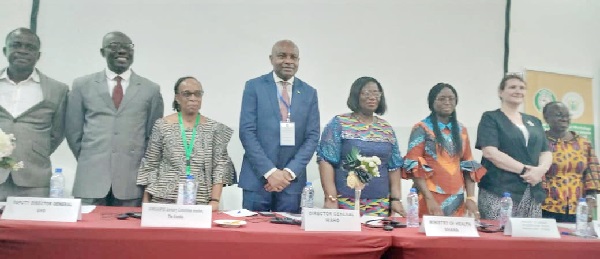
Ghana collaborates to improve adolescent health
Ghana is collaborating with five other West African countries in a research project aimed at improving the health and quality of life of women, newborns, children and adolescents in the sub-region.
They are Burkina Faso, Côte d’Ivoire, Niger, Sierra Leone and Senegal.
The research project, funded by the International Development Research Centre (IDRC) of Canada, is aimed at strengthening transformative leadership capacities in West Africa to encourage improved institutional and government use of health research and scientific evidence to influence policies and interventions in the health sector.
Reducing maternal mortality
This was made known at the opening of a two-day dissemination workshop in Accra for the research project teams from the six countries.
The workshop, on the theme: "catalysing leadership to improve health outcomes for women, newborns, adolescents and children in West Africa," is being organised by the Ghana Health Service, the Ministry of Health, Ghana, the Alliance for Reproductive Health Rights, Women Media and Change (WOMEC) and the West African Health Organisation (WAHO).
Opening the workshop, the Minister of Health, Kwaku Agyeman-Manu, in a speech read on his behalf, said the project aligned with Ghana's 2020 – 2030 Universal Health Coverage Roadmap which sought to, among others, reduce avoidable maternal, newborn child and adolescent deaths in the country.
He said the government was relentless in ensuring that women, newborns, children and adolescent groups attained the best quality of health services to enhance their lives and well-being.
Mr Agyeman-Manu said that had led to some interventions such as the implementation of the “Free Maternal Health Policy” under the National Health Insurance Scheme to expand access to maternal health services for women of childbearing age and strengthening of the Expanded Programme on Immunisation (EPI).
He said the project further led to the sustainability of the national immunisation coverage ratio of 99.4 per cent to enhance the health and well-being of all newborns, infants and immunisation eligible children in Ghana.
Recently, he said an Essential Health Service Package which would provide a comprehensive range of services to all cohorts of the population using the life course approach had been finalised.
Population
The population of West Africa, the minister said, was currently estimated at about 420 million with a youthful population and women, new-borns, children and adolescents forming more than half of the total population and an important demographic group for the attention of policy makers.
He said beyond the direct causes of preventable illness and death of these groups, some factors such as health system challenges, including inadequate materials and human resources; congestion and lack of beds at health facilities; poor emergency transport systems, poor referral, communication systems and lately the COVID -19 pandemic also served as indirect contributory factors.
"Putting in place interventions to improve the health and wellbeing of these groups is important for the individual country, as well as the sub-region," he said.
Canada support
The Canadian High Commissioner to Ghana, Kati Csaba, said without improving the health of women, children and adolescents, it would be difficult to meet country-led development objectives.
"A population that is healthy and thriving has a better chance of growing the economy, being resilient against new shocks and making progress on achieving the Sustainable Development Goals," she said.
The health and wellbeing of women and girls, she said, was a central facet of Canada's Feminist International Assistance Policy aimed at eradicating poverty and building a more peaceful, inclusive and prosperous world, with women and girls at the heart of all policy and programme decisions.
Adolescent pregnancy
A Principal Programme Officer at the Ministry of Gender, Children and Social Protection, Vera Karikari Bediako, said the ministry had developed a five-year National Gender Policy to mainstream gender equality concerns into the national development process.
The policy document, Ms Bediako said, was currently being reviewed and updated to address bottlenecks and barriers in various sectors concerning inequalities.
To ensure a coordinated response in addressing adolescent pregnancies in Ghana, she said the ministry had also developed a five-year strategic plan and a Strategic Implementation Plan that would help identify areas where interventions must be strengthened or modified.
"This became necessary as a result of the increasing number of adolescent pregnancies and their negative impact on the health and socio-economic wellbeing of the youth, particularly adolescent girls," she said.
The Director-General of the West African Health Organisation (WAHO), Stanley Okolo, expressed the hope that the workshop would facilitate the exchange of the project’s results, the lessons learnt and how to scale up findings in all the 15 ECOWAS countries to achieve their objectives.
